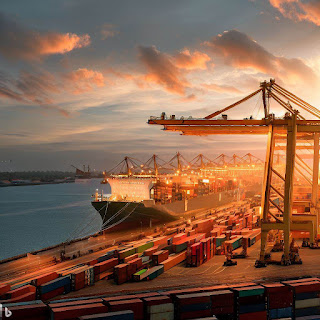Detention in International Trade: Understanding the Holding or Delay of Goods/Cargo at Ports, Terminals, or Customs Facilities

In the realm of international trade, the smooth flow of goods and cargo is crucial for businesses to meet customer demands and maintain profitability. However, delays and detentions at ports, terminals, or customs facilities can disrupt supply chains, leading to financial losses and strained relationships between trading partners. This article aims to shed light on the concept of detention in international trade and explore its causes, impacts, and potential solutions.
Understanding Detention in International Trade
Detention refers to the holding or delay of goods or cargo beyond the agreed-upon timeframes at ports, terminals, or customs facilities. It occurs when shipments are unable to proceed due to various reasons such as administrative issues, documentation discrepancies, inspections, security concerns, congestion, labor disputes, or even natural disasters.
Causes of Detention
1. Administrative Issues: Delays can occur due to administrative inefficiencies such as incomplete paperwork or errors in documentation. These issues often arise from miscommunication between parties involved in the trade process.
2. Inspections and Security Concerns: Customs authorities may conduct inspections on shipments to ensure compliance with regulations and detect any illegal activities. If a shipment raises suspicions or requires additional scrutiny due to security concerns, it can result in prolonged detention.
3. Congestion at Ports/Terminals: High volumes of incoming cargo combined with limited infrastructure capacity can lead to congestion at ports and terminals. This congestion can cause delays as containers wait for available space for unloading or further transportation.
Impacts of Detention
1. Financial Losses: Detention can result in significant financial losses for importers/exporters due to demurrage charges imposed by shipping lines for exceeding free storage time at ports/terminals. Additionally, delayed deliveries may lead to missed sales opportunities or contractual penalties.
2. Disrupted Supply Chains: Detention disrupts the smooth flow of goods, affecting supply chains and causing delays in subsequent production processes. This can lead to increased costs, reduced customer satisfaction, and damaged business relationships.
3. Increased Inventory Holding Costs: Extended detention periods require importers/exporters to hold excess inventory at ports or terminals, leading to additional storage costs and tying up working capital.
Solutions and Best Practices
1. Improved Communication: Enhancing communication between all parties involved in the trade process, including shippers, freight forwarders, customs authorities, and port/terminal operators, can help prevent misunderstandings and reduce administrative errors.
2. Enhanced Documentation Accuracy: Ensuring accurate and complete documentation is crucial to avoid delays caused by customs inspections or administrative issues. Utilizing digital platforms for document submission can streamline the process and minimize errors.
3. Infrastructure Development: Investing in port/terminal infrastructure upgrades can alleviate congestion issues and improve efficiency in handling cargo. Expanding capacity, implementing advanced technologies, and optimizing operational processes can help reduce detention times.
4. Collaboration with Customs Authorities: Establishing strong relationships with customs authorities through regular dialogue can facilitate smoother clearance procedures and minimize delays caused by inspections or security concerns.
Conclusion
Detention in international trade poses significant challenges for businesses involved in global supply chains. Understanding the causes of detention, its impacts on trade operations, and implementing effective solutions are essential for businesses to meet customer demands and maintain profitability.







Comments
Post a Comment